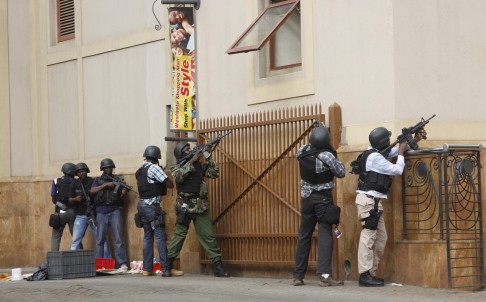Nairobi police anti-terror unit has to get by on US$735 a month
Special police unit lacks funding to prevent another extremist Westgate Mall-type attack in Nairobi, documents and officials suggest
PUBLISHED : Monday, 17 March, 2014, 5:31am
UPDATED : Monday, 17 March, 2014, 5:52am
Associated Press in Nairobi

Special forces at the scene of September's terrorist attack on a Nairobi shopping mall, which left 67 people dead. Photo: AP
Kenya's lead counterterrorism agency is working to stop another Westgate Mall-style terrorist attack - which many in Nairobi believe Somali militants will try again - on a shoestring budget: the Anti-Terror Police Unit in the capital has just US$735 to spend this month.
Documents show that even after the September attack by al-Shabab on an upscale mall in Nairobi that killed at least 67 people, the country's top anti-terror security force is allocated only around US$2,205 for its operations - for maintenance and fuel for cars, travel expenses and office supplies - in January, February and March. By comparison, a Kenyan member of Parliament earns about US$45,000 in salary and allowances during a three-month period.
Kenya is facing a budgetary crisis brought on by high salaries paid to some government employees, its government has said. President Uhuru Kenyatta and his vice-president have each pledged to take a 20 per cent pay cut, and Kenyatta is urging other top government officials to do the same. Kenyatta also said more resources would be allocated to the police and military.
The anti-terror unit is struggling to do its work because of limited funds, said a security official from the police headquarters who insisted on anonymity. The limited budget makes preventing another attack difficult, he said.
The spokesman for Kenya's Internal Security Ministry, Mwenda Njoka, denied that Nairobi's anti-terror unit had been allocated only US$2,205 for the quarter. He did not provide any alternative figures.
Combating terrorism is a capital-intensive exercise because of the time and manpower needed to try to learn the identity of would-be attackers, the security official said. Somali terrorists are financing their terror attacks with more funds than Kenya is spending on the Anti-Terror Police Unit, the source said.
He cited an incident in September 2012 in which police stopped a planned attack on Parliament. A suspect was arrested in a house in a Somali section of Nairobi with four suicide vests, two improvised explosive devices, four AK-47 rifles and ammunition, the official said.
The suspect told police that he had been given about US$82,000 to carry out surveillance and launch the attack. The official said the suspect claimed he had once been arrested by police who noticed his surveillance activities but was released after paying a US$470 bribe.
A second security official said the anti-terror unit did not have bulletproof vests and in some jurisdictions along the border with Somalia known as terrorism hot spots the anti-terror unit did not have a single police car.
Alamin Kimathi, a human-rights activist who has been the biggest critic of the anti-terror police, believes the unit is heavily supported by the West and that this funding affects its priorities. More often the unit's work is driven by a Western agenda, he said.
"He who pays the piper calls the tune," Kimathi said.
Human-rights activists often accuse the anti-terror unit of killing suspects whom they cannot successfully prosecute.
Rights groups have said 18 people suspected of having links to terror networks had either been executed or disappeared in 2012; 13 people suffered the same fate in 2013.
Kenya is one of the top five global recipients of US State Department anti-terrorism funding, which supports border and coastal security and law-enforcement programmes, according to a September report by the US Congressional Research Service.
In fiscal year 2013 a US-Kenyan law-enforcement co-operation programme had a budget of US$7.75 million, which is divided among multiple security services in Kenya and goes towards training and equipment.
The Anti-Terror Police Unit was formed in 2003.
